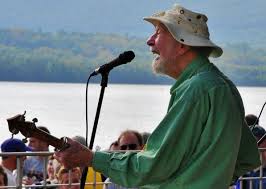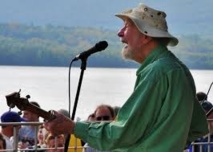"It's a myth that protest music has disappeared," said Alexander Shashko, who teaches the relationship between race, politics and popular culture at the University of Wisconsin in Madison.
"Run through the list of the biggest stars in the world, from Beyonce to Bruce Springsteen to Lorde, and articulating social change is a significant part of their music," he told AFP.
Dubbed "America's tuning fork" by poet Carl Sandburg, the banjo-player left behind folk classics like "Where Have All the Flowers Gone," "If I Had a Hammer," "Turn! Turn! Turn!" and "We Shall Overcome."
Many will associate him with the 1960s, a decade of profound social and political change, when young Americans took to the streets to condemn the Vietnam war and demand civil rights for all races.
Today's songwriters and performers have other issues on their minds, as demonstrated at the Grammy awards Sunday where 33 couples -- both gay and straight -- exchanged wedding vows.
Macklemore and Ryan Lewis, winners of four Grammys, performed their anthem "Same Love," which served as the theme song of the gay marriage campaign in the rap duo's home state of Washington.
Sara Bareilles, 34, and Hunter Hayes, 22, separately addressed bullying with piano renditions of "Brave" and "Invisible" respectively.
New Zealand's Lorde, 17, mocked gratuitous celebrity bling with "Royals," the Grammy-winner for best song.
And there was Kacey Musgraves, who bested the likes of Taylor Swift to win the best country album Grammy for "Same Trailer Different Park," which depicts gritty rural America in a way Seeger would have instantly recognized.
"A protest song asks the questions that some might think shouldn't be asked," said Val Haller, whose ValsList.com blog "helps busy adults keep up with new music."
"It does not have to be harsh, angry or pushy. Rather, it can be an instrument to create a sense of community around a thought."
Case in point: Ed Sheeran, 22, a ginger-haired British singer-songwriter with a sweet demeanor who toured North America with Swift last year. Teenage girls make up his global fan base, but his ballads cast a uncomfortable harsh light on homelessness, drugs and prostitution.
At National Public Radio (NPR), music critic Ann Powers cited Bruce Springsteen as a prime example of a big-name rock star who can sell out stadiums gigs while tackling political themes.
The 64-year-old paid tribute to Seeger in a 2006 album "We Shall Overcome: The Seeger Sessions," but he embraced protest years before, not least with his 1984 hit "Born in the USA," an ode to the working man in dark spiritual crisis.
His latest studio album "High Hopes," released earlier this month, includes "American Skin (41 Shots)," about the police killing of a young African immigrant in 1999 that won Springsteen no friends among New York's Finest.
Among younger performers, Powers is excited by Hurray for the Riff Raff, a country-folk band out of New Orleans, Louisiana fronted by Alynda Lee Segarra, 27, a one-time street busker and train-hopping hobo whose song topics include sexual assault.
"I definitely think that political music is not as visible or as centralized as it used to be -- and I think that has to do with how music in general is no longer visible or centralized as it used to be -- and that's because of the Internet," she said.
Hip hop has been politically engaged since its inception and the days of "The Message," Grandmaster Flash and the Furious Five's 1982 rap tour of run-down New York public housing projects?
At this year's MTV Video Music Awards, Kanye West, 36, invoked the legacy of slavery with "Blood on the Leaves" against a backdrop of dark images provided by Steve McQueen, director of the Oscar-nominated "12 Years a Slave."
As for the old-school folk scene, the spirit of protest thrives with such artists as Andy Cohen and Joe Jencks, said Stephen Winick of the American Folklife Center at the Library of Congress in Washington.
The center is an important repository of America's folk music heritage -- and Seeger was active in its work since the 1930s.
"Protest music really does continue to be strong, and you can say there hasn't been any lull at all," Winick told AFP. "Just because it's not a single person with a guitar or banjo doesn't mean it's not protest music."
--------------------------------------------------------------
"Run through the list of the biggest stars in the world, from Beyonce to Bruce Springsteen to Lorde, and articulating social change is a significant part of their music," he told AFP.
Dubbed "America's tuning fork" by poet Carl Sandburg, the banjo-player left behind folk classics like "Where Have All the Flowers Gone," "If I Had a Hammer," "Turn! Turn! Turn!" and "We Shall Overcome."
Many will associate him with the 1960s, a decade of profound social and political change, when young Americans took to the streets to condemn the Vietnam war and demand civil rights for all races.
Today's songwriters and performers have other issues on their minds, as demonstrated at the Grammy awards Sunday where 33 couples -- both gay and straight -- exchanged wedding vows.
Macklemore and Ryan Lewis, winners of four Grammys, performed their anthem "Same Love," which served as the theme song of the gay marriage campaign in the rap duo's home state of Washington.
Sara Bareilles, 34, and Hunter Hayes, 22, separately addressed bullying with piano renditions of "Brave" and "Invisible" respectively.
New Zealand's Lorde, 17, mocked gratuitous celebrity bling with "Royals," the Grammy-winner for best song.
And there was Kacey Musgraves, who bested the likes of Taylor Swift to win the best country album Grammy for "Same Trailer Different Park," which depicts gritty rural America in a way Seeger would have instantly recognized.
"A protest song asks the questions that some might think shouldn't be asked," said Val Haller, whose ValsList.com blog "helps busy adults keep up with new music."
"It does not have to be harsh, angry or pushy. Rather, it can be an instrument to create a sense of community around a thought."
Case in point: Ed Sheeran, 22, a ginger-haired British singer-songwriter with a sweet demeanor who toured North America with Swift last year. Teenage girls make up his global fan base, but his ballads cast a uncomfortable harsh light on homelessness, drugs and prostitution.
At National Public Radio (NPR), music critic Ann Powers cited Bruce Springsteen as a prime example of a big-name rock star who can sell out stadiums gigs while tackling political themes.
The 64-year-old paid tribute to Seeger in a 2006 album "We Shall Overcome: The Seeger Sessions," but he embraced protest years before, not least with his 1984 hit "Born in the USA," an ode to the working man in dark spiritual crisis.
His latest studio album "High Hopes," released earlier this month, includes "American Skin (41 Shots)," about the police killing of a young African immigrant in 1999 that won Springsteen no friends among New York's Finest.
Among younger performers, Powers is excited by Hurray for the Riff Raff, a country-folk band out of New Orleans, Louisiana fronted by Alynda Lee Segarra, 27, a one-time street busker and train-hopping hobo whose song topics include sexual assault.
"I definitely think that political music is not as visible or as centralized as it used to be -- and I think that has to do with how music in general is no longer visible or centralized as it used to be -- and that's because of the Internet," she said.
Hip hop has been politically engaged since its inception and the days of "The Message," Grandmaster Flash and the Furious Five's 1982 rap tour of run-down New York public housing projects?
At this year's MTV Video Music Awards, Kanye West, 36, invoked the legacy of slavery with "Blood on the Leaves" against a backdrop of dark images provided by Steve McQueen, director of the Oscar-nominated "12 Years a Slave."
As for the old-school folk scene, the spirit of protest thrives with such artists as Andy Cohen and Joe Jencks, said Stephen Winick of the American Folklife Center at the Library of Congress in Washington.
The center is an important repository of America's folk music heritage -- and Seeger was active in its work since the 1930s.
"Protest music really does continue to be strong, and you can say there hasn't been any lull at all," Winick told AFP. "Just because it's not a single person with a guitar or banjo doesn't mean it's not protest music."
--------------------------------------------------------------









 Home
Home Politics
Politics











